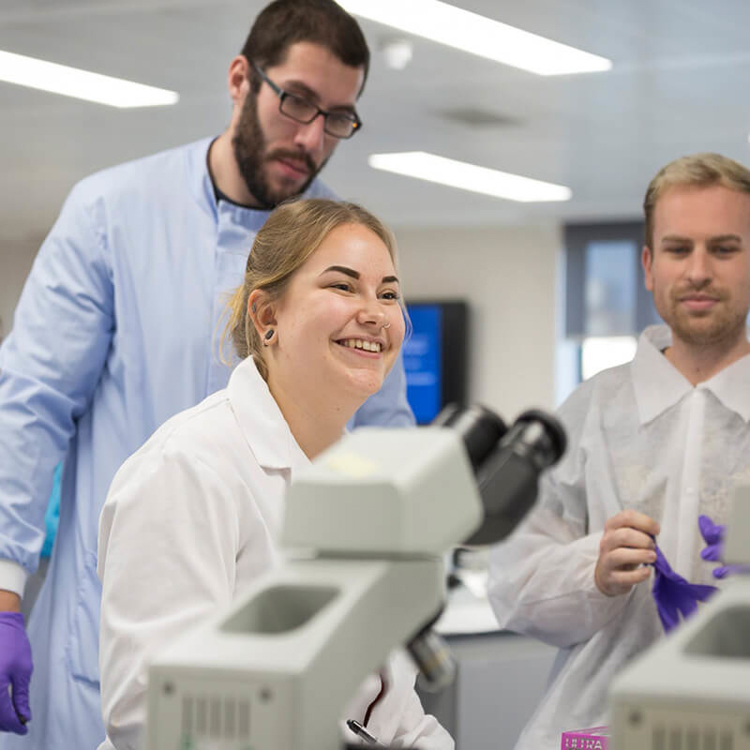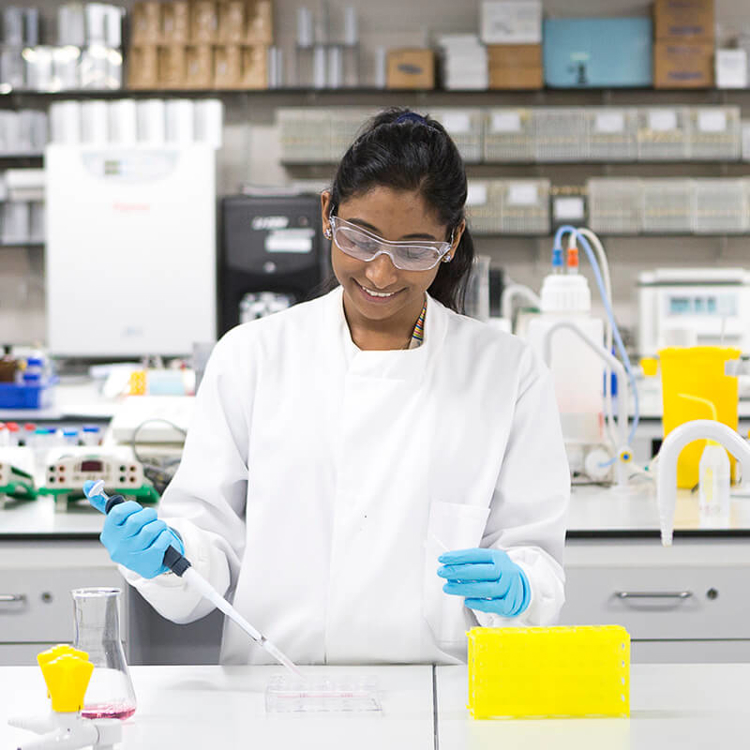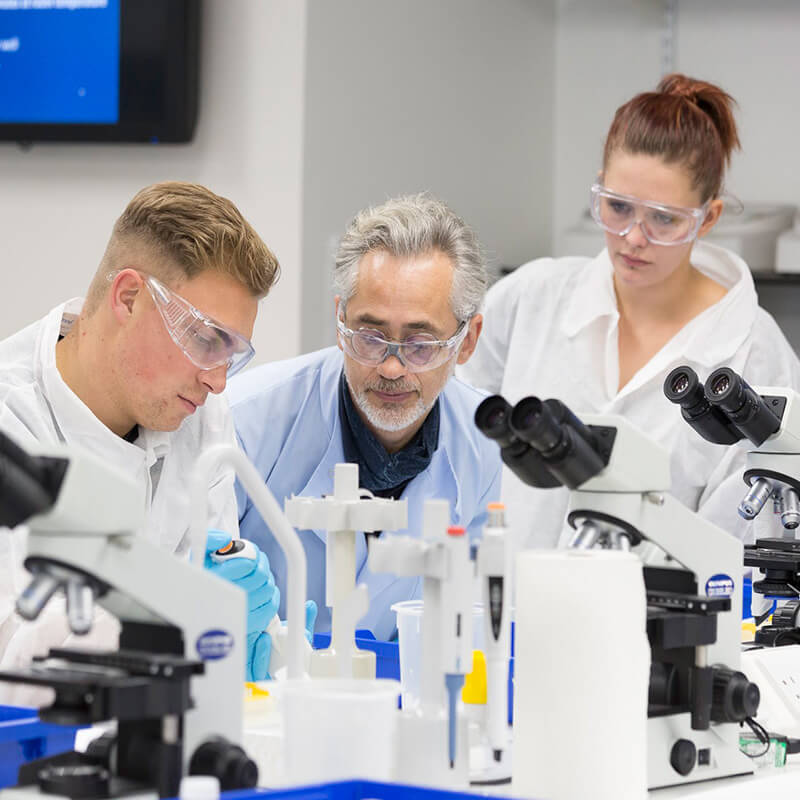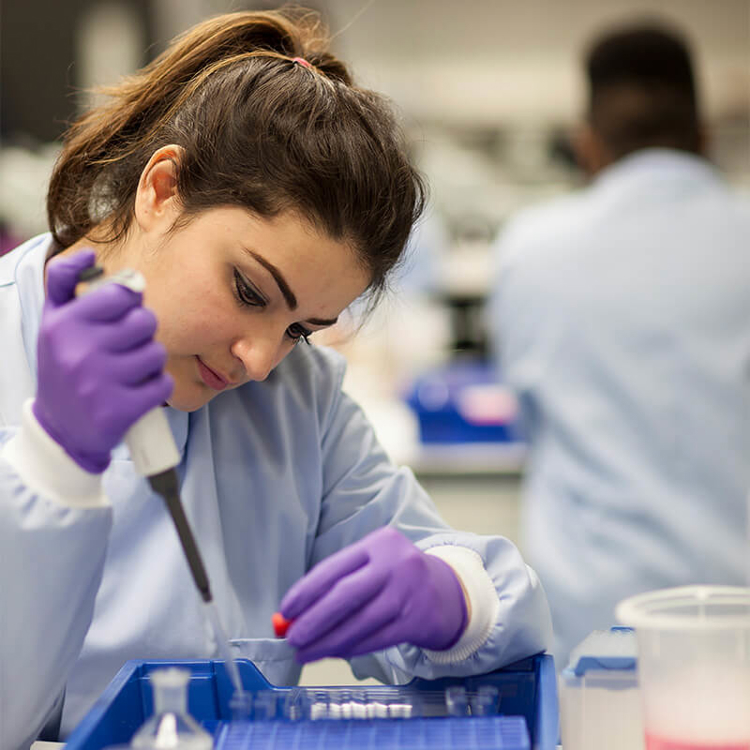Duration:
1 year (full-time)
Number of credits:
180
Start date(s):
September 2026
Advance your career with our MSc Advanced Biomedical Science and develop the expertise to transform global healthcare practice and clinical research.
In an evolving Clinical Science landscape, our MSc Advanced Biomedical Science course equips you with the specialist knowledge and practical expertise/skills needed to thrive in clinical, research, and NHS-related industrial settings.
This programme blends cutting-edge laboratory training with research-led teaching, delivered by expert academics and practising biomedical scientists working within NHS pathology laboratories.

Did you know?
This course supports key UN Sustainable Development Goals, including Good Health and Wellbeing, Quality Education, and Industry Innovation, promoting real-world impact through NHS and IBMS partnerships and sustainable healthcare practice.
Explore real-world biomedical science through a multidisciplinary curriculum, gaining skills to advance diagnostics, tackle global health challenges, and drive innovation.
Laboratory-based research projects form a key part of the course, helping you develop the technical ability and ethical grounding required to conduct high-quality biomedical research. You'll also build strong data analysis and critical evaluation skills, giving you the tools to make a meaningful impact in your chosen field.
Whether you’re seeking to specialise, pursue a research career, or move into leadership roles, this programme will prepare you for a dynamic future in biomedical science.
Modules
These modules are those we currently offer for 1 year (full-time) and may be subject to change.
Module details: This module is designed to cultivate both the technical expertise and professional competencies essential for success in modern biomedical practice. It offers hands-on training in advanced analytical methods, experimental design, and quality assurance.
Module details: This module offers an in-depth exploration of how pathogens cause disease and how the immune system responds to infection. Learners will develop a critical understanding of current diagnostic and therapeutic approaches while deepening their knowledge of the molecular and cellular basis of host–pathogen interactions. It also explores Immunodiagnostics including serological tests (e.g., ELISA, agglutination). Use of monoclonal antibodies as therapeutic applications in immunotherapies.
Module details: This module explores advanced concepts in molecular biology and cellular pathology to understand how molecular dysfunction leads to disease. Learners will examine key processes such as gene expression, epigenetic regulation, genome stability, cell signalling, and how their disruption contributes to conditions like cancer, inherited disorders, and neurodegenerative diseases
Module details: This module equips students with essential research and analytical skills for critically evaluating scientific studies and applying evidence-based practice in biomedical science, nutrition, health, and life sciences. Students will engage with both foundational and advanced statistical methods, integrating these with practical data analysis and research design principles to support future discipline-specific research.
Module details: This module is shared across postgraduate programmes in Life and Health Sciences and is designed to support students in undertaking research projects through a combination of lectures, lecturer-led group investigations, or an individual dissertation. Research activities may include laboratory-based experiments, non-laboratory data collection, or an in-depth systematic review. The module offers students the opportunity to apply their knowledge and skills within a research setting, while developing the ability to communicate effectively with a scientific audience.
Professional Experience Year
This course also offers the option of a Professional Experience Year. This programme combines dynamic career modules with flexible placement opportunities. After completing your first year of study, you'll then complete a full year of Professional Experience training as part of your degree. This will give you real career experience. This unique opportunity offers you distinct paths to build your expertise.
Careers
This programme opens the door to a wide range of careers across clinical and research laboratories, industry, and beyond.
Graduates commonly pursue roles in medical research, NHS biomedical science, health charities, and biomedical-focused industries. Typical employers include the NHS, Health and Safety Executive (HSE), pharmaceutical industries, NHS Blood and Transplant (NHSBT), and UK Health Security Agency.
Career paths may include roles such as biotechnologist, clinical scientist (in areas like biochemistry, microbiology, haematology, or genomics), research scientist, and scientific writer or publisher.
You’ll benefit from expert career counselling, guest lectures from NHS pracademics and IBMS professionals, and opportunities to explore internships with industry partners.

The Student Futures team is here to support you throughout your time at Roehampton and beyond.
They offer services tailored to your needs, helping you take confident steps towards your future.
You’ll have access to a wide range of career workshops and events, where you can engage with employers and develop the skills you need to succeed in the workplace.
These opportunities will help you build your CV, prepare for interviews, and connect with successful Roehampton graduates who are thriving in their careers. You’ll also be able to engage with our partners across London and beyond.
Wherever you want to go in the future, you'll be preparing for the world of work from your very first day.
Learning & assessment
You’ll learn in a dynamic, inclusive environment that blends academic theory with practical, problem-based learning to prepare you for real-world biomedical science settings.
Our research-active lecturers bring cutting-edge expertise into the classroom, delivering high-quality teaching informed by current scientific developments. From face-to-face lectures and lab sessions to seminars, workshops, and case-based discussions, you’ll build specialist knowledge alongside essential transferable skills.
Laboratory work runs alongside theoretical learning, helping you develop the confidence to design and conduct experiments, a key skill for research and industry roles.
Throughout your studies, you’ll be supported by a collaborative teaching team and benefit from feedback mechanisms designed to support continuous improvement. We also work closely with employers, regulatory bodies, and students to ensure the curriculum reflects current needs and future opportunities.

How you’ll learn
This programme is designed to develop both academic knowledge and professional skills in a supportive, research-informed environment. You’ll apply what you learn to real-world scenarios, building practical competencies including effective and ethical use of AI, essential for a wide range of careers in biomedical science. Teaching is inclusive, global in perspective, and aligned with IBMS professional standards to ensure your learning remains relevant and career-focused.
Your learning experience will include:
- Case studies exploring global health issues, inequalities, and sustainability
- Projects examining international public health policies and clinical guidelines
- Professionally focused, employer-informed assignments
- Technology-enhanced learning with industry-relevant software
- Collaborative research with academic and industry partners
- Development of key intellectual and communication skills alongside technical expertise
How you'll be assessed
Assessment on this programme is designed to help you demonstrate your knowledge, skills, and progress in a clear, supportive way, training you to apply these skills in the industry. You'll be assessed through a combination of formative and summative methods that reflect your learning at each stage of the course, aligned to module and programme-level outcomes.
Your assessment experience will include:
- Formative assessments to monitor progress, build confidence, and provide feedback with feed-forward tasks ahead of formal submissions
- Summative assessments that contribute to your final grade, focused on understanding and applying scientific skills/writing, presentation, and critical analysis
- Clear guidance and insight into expectations for each assessment
- A continuous learning approach that links each module to future learning and skill development

Hands-on learning in state-of-the-art facilities
Our Biomedical Science facilities are designed to support practical learning and innovative research. Based at Whitelands College, a beautiful listed building overlooking Richmond Park, you will have access to a range of modern laboratories and specialist equipment used in biomedical research and diagnostics.
Students can gain hands-on experience with specialist resources including tissue culture facilities, gas chromatography systems, LC-MS, automatic cryostat with tissue staining, clinical analysers, PCR and qPCR machines, and fluorescence microscopes.
Open days
Get a real taste of our campus, community and what it’s like to study at Roehampton
Applying
Full-time UK postgraduate students apply through our direct application system.
Course subject to curriculum review and validation.
Entry tariff
Looking to work out your UCAS points or find out about our entry requirements? Find out more.
When we consider applications to study with us, we form a complete view of your achievements to date, and future potential, and can offer flexibility in entry requirements. Find out more about our Contextual Offer scheme.
Specific entry requirements
At least 2.2 honours UK degree or international equivalent (overall 60% or above in life sciences related international UG degrees).
General entry requirements
September 2026 entry tuition fees
Year one fees
To be confirmed.
We offer a wide range of scholarships and bursaries. See our financial support pages for UK students.
We also provide other ways to support the cost of living, including free buses and on-campus car parking, hardship support and some of the most affordable student accommodation and catering in London. Find out more about how we can support you.
International undergraduate students apply through our direct application system.
Course subject to curriculum review and validation. [REMOVE IF NOT NEEDED]
Entry tariff
Looking to work out your UCAS points or find out about our entry requirements? Find out more.
When we consider applications to study with us, we form a complete view of your achievements to date, and future potential, and can offer flexibility in entry requirements. Find out more about our Contextual Offer scheme.
Specific entry requirements
At least 2.2 honours UK degree or international equivalent (overall 60% or above in life sciences related international UG degrees).
General entry requirements
September 2026 entry tuition fees
Year one fees
To be confirmed.
We offer a wide range of scholarships and bursaries. See our financial support pages for international students.
We also provide other ways to support the cost of living, including free buses and on-campus car parking, hardship support and some of the most affordable student accommodation and catering in London. Find out more about how we can support you.

